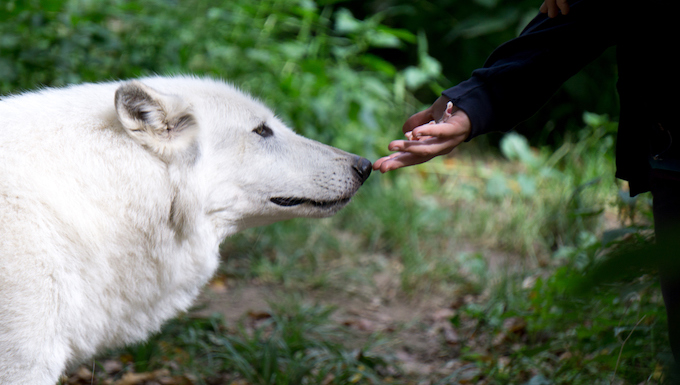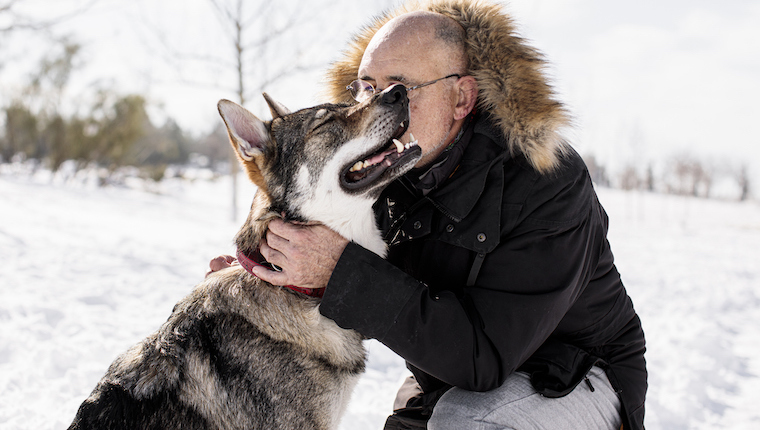
Many of us are familiar with the domestication of dogs. We’ve heard some iteration of a story where early humans threw scraps to the most bold wolves. Over time, these wolves bred and grew closer to humans. After many years and selective breeding for the friendliest wolves, the early dog emerged as a companion. However, there’s new evidence that before we domesticated the wolf, we welcomed them to our homes. Many of our preconceived notions about wolves paint them as fearsome predators that couldn’t coexist with us. New research suggests, however, that might not be the case. Scientists have now proven that wolves can distinguish between strangers and people they know, and show much more affection to those familiar to them.
Man’s (Earliest) Best Friend
Scientists tested ten wolves and 12 dogs to see how they behaved in stressful situations. Both the wolves and dogs studied showed the person they were familiar with more affection. “It was very clear that the wolves, as the dogs, preferred the familiar person over the stranger,” said Dr. Hansen Wheat, a behavioral ecologist from Stockholm University, Sweden, and lead author of the study.
But what was perhaps even more interesting was that while the dogs were not particularly affected by the test situation, the wolves were. They were pacing the test room. However, the remarkable thing was that when the familiar person — a hand-raiser that had been with the wolves all their lives — re-entered the test room, the pacing behavior stopped. This indicates that the familiar person acted as a social stress buffer for the wolves. Previous perceptions of our domestication of the dog indicated that attachment to us only began after domestication, but these findings dispute that.
So if wolves have a real capability to bond to us, why did we end up shaping them into dogs? It’s unclear why exactly our domestication process began. There’s increasing evidence that points towards dogs first being needed as hunting companions.
The Separation of Wolf and Dog
The wolf and the dog were once the one and the same. However, the modern dog and the wolf are more different than they are alike. The skull and jaw are larger and stronger in the wolf. This means that play-biting in a wolf’s puppyhood would be much more dangerous than your mouthy Lab that needs more training. Additionally, wolves don’t have the same desire to please.
“We’ll be trying to get [wolves] to do a behavior, and eventually they’ll look at me and they’ll be like, ‘You’re making this too hard,’ and they’ll walk off and they’ll go find something else to eat. They’re like, ‘I have food, I can go find my own.’” says Michelle Proulx, director of Animal Caretaker and Educational Programs at W.O.L.F. Sanctuary in Laporte, Colorado. Not exactly convenient to have around the household.
Wolves are also in some regards more intelligent than dogs. They’re more willing to problem solve than an average dog. In one study, dogs and wolves had to work together to solve a puzzle in order to get a treat. “They had to pull a rope at the same exact time in order for the tray to slide in and give them foods. The wolves figured it out quickly. The dogs never really figured out the problem until they had a human teach them that they need to pull the rope. Even more fascinating was that when the testers made the puzzle more challenging, the wolves still succeeded. The wolf would wait until the other wolf was let into the experiment, so they could get the treat together.” says Proulx.
Why Dogs Instead of Wolves?
While the wolf’s natural beauty, intelligence, and strength can be intriguing, remember that they’re best suited for the wild, not your living room. There’s many reasons we chose to domesticate dogs instead. Some may feel that the dangers of a wild animal are reduced through hybridization.
In many circumstances, high content hybrids or wolf-dogs can be just as dangerous as a wild animal in the home. Unfortunately, there isn’t an approved rabies vaccine for wolf dogs. Any wolf dog that bites a person or another pet can be considered a rabies risk. If your animal was to bite someone, they would sadly have to be euthanized regardless of whether or not they had been exposed to rabies.
Wolves and dogs mature at different rates. The physical and mental development of a wolfdog is unpredictable. Sexual maturity of wolves signals a shift in hormone quantity and balance. This hormonal change is often coupled with behavioral changes in the animal, which can be severe and hard to control. And even with ample space to play and roam (which, keep in mind, is a LOT), a wolf dog may follow their natural instincts to mark their territory: the home.
Keep in mind that, even if you had done lots of research and felt you were able to provide an adequate home for a wolfdog, life might not be easy for them. Legality is blurry and wolf hybrids cannot be owned everywhere. Additionally, if you are to suddenly become unable to care for your pet, you might not be able to find a new caretaker.









